The ministry said Moscow requested Belarus to represent it hours after announcing its suspension on Tuesday.
"Belarus expresses its consent to represent Russia in the group and intends to do this in an unbiased manner and without putting its own interests at risk," Belarusian Foreign Ministry spokesman Dmitry Mironchik said in a statement.
Anton Mazur, head of the Russian Delegation to the Vienna Negotiations on Military Security and Arms Control, said, addressing the JCG plenary session on Tuesday, that Russia has decided to suspend its work in JCG meetings beginning March 11.
The suspension finalizes Moscow's unilateral moratorium on the implementation of the CFE treaty declared in a decree issued by President Vladimir Putin in 2007.
The CFE Treaty was originally signed in 1990 by 22 states, including 16 NATO and six Warsaw Pact members. The treaty set equal limits for each bloc on five key categories of conventional armaments and military hardware, including tanks, combat armored vehicles, artillery, assault helicopters and combat aircraft.
In 1999, the treaty was adapted but NATO members refused to ratify it until Russia withdrew troops from Georgia and the breakaway Moldovan region of Transnistria, a condition Russia regarded as an "artificial linkage."
In 2007, Russia imposed a unilateral moratorium on the CFE treaty, citing concerns over NATO plans to increase its military presence in Eastern Europe and the alliance's refusal to ratify the adapted version of the treaty.
In 2011, NATO responded by saying they would no longer exchange information on conventional weapons and troops with Russia.



